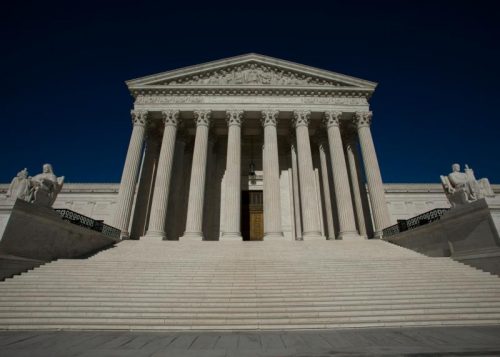Nominating a Supreme Court justice is one of the most long-term-influential duties a sitting U.S. president has to do. The only court established by our Constitution, the Supreme Court is the highest court of the land and defender of the Constitution to ensure our country is governed by its founding principles.
The Supreme Court was faced with a pivotal case in our first century as a nation — Dred Scott v. Sandford (1857). Dred Scott, a slave from Missouri, sued for his freedom on the grounds that his master had taken him for extended periods of time to Illinois and the territory of Wisconsin, both of which prohibited slavery. The Supreme Court ruled that members of the African race were not, and could never become, citizens and that Scott had no standing to file the lawsuit.

The court also ruled that the Missouri Compromise, a law enacted by Congress that prohibited slavery in certain territories of the Louisiana Purchase, was unconstitutional. Many were outraged at the decision which only added to the tensions that led to the Civil War a few years later.
Yet, while the Civil War raged, President Lincoln appointed Salmon P.Chase, a strong anti-slavery advocate, to be chief justice. Eleven years later in the aftermath of the Civil War, the 14th Amendment was passed and ratified (1868)basically overturning the Dred Scott decisions, granting citizenship to all freed slaves and preventing states from altering the “privileges and immunities of citizens,” denying due process of law, and denying equal protection of the laws to any person.
Many cases came before the court in the post–Civil War era that involved interpretation of the 14th Amendment. In Plessy v. Ferguson (1896), the equal protection clause did not prohibit racial segregation in public facilities, as long as the facilities were equal. (This was overturned in 1954).
The due process clause of the 14th Amendment was used by the court to support its claim in Roe v. Wade (1973) that the basic right to privacy is protected and a woman’s right is “fundamental,” meaning that governmental attempts to interfere with the right are subject to “strict scrutiny.”
We are now faced with another pivotal time of the court. President Trump has exercised his duty upon the retirement of Justice Anthony Kennedy and nominated Brett Kavanaugh, a 53-year-old D.C. Circuit Court judge and a Catholic, to the highest court of the land.
Many labels have been placed on Judge Kavanaugh: conservative, constitutionalist, a threat to women’s reproductive rights, the vote possible to overturn Roe v. Wade, and the list goes on. But, no matter who is placed on the bench, we should hope for a person who will focus on correctly determining the objective, original meaning of the Constitution’s text, depending upon what the Constitution’s original meaning prescribes in each case.

Cardinal Daniel DiNardo of Galveston-Houston, president of the U.S. Conference of Catholic Bishops, wrote to members of the Senate July 6, urging them not to use support for Roe v. Wade as a litmus test for judicial nominees in their deliberations about the upcoming court vacancy.
The letter expresses “grave concerns about the confirmation process … being grossly distorted by efforts to subject judicial nominees to a litmus test in support of Roe, as though nominees who oppose the purposeful taking of innocent human life are somehow unfit for judicial office in the United States.
“By any measure,” the cardinal continued, “support for Roe is an impoverished standard for assessing judicial ability. For forty-five years, Roe has sparked more informed criticism and public resistance than any other court decision of the late 20th century.”
The Pro-Life Secretariat of the USCCB has stated that we must pray and continue to educate about how Roe “is not health care, is bad law, and fails women.”
From Friday, Aug. 3, to Friday, Sept. 28, Catholics are being urged to participate in a nine-week effort of prayer, fasting and education that this change in the Court “will move our nation closer to the day when every human being is protected in law and welcomed in life.”
Using the USCCB Call to Prayer network, participants can receive a weekly email or text reminder to pray and fast along with a fact about Roe to share with others including their U.S. senators.
To participate in this novena, visit www.usccb.org/pray. Pray for the unborn, for women struggling with unplanned pregnancy, and for courage for our legislators to put aside their differences and lead our nation in the way of truth and peace.
Chris Codden is director of the Office of Marriage and Family of the Diocese of St. Cloud. Contact her at ccodden@gw.stcdio.org.






















